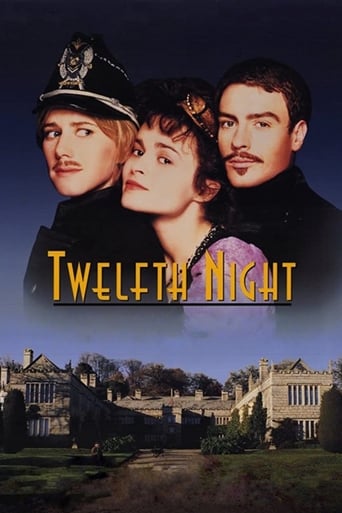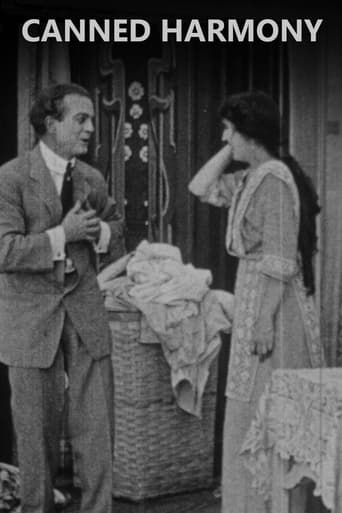

Twelfth Night (1996)
Shakespeare's comedy of gender confusion, in which a girl disguises herself as a man to be near the count she adores, only to be pursued by the woman he loves.
Watch Trailer
Cast
Similar titles






Reviews
For all the hype it got I was expecting a lot more!
It is neither dumb nor smart enough to be fun, and spends way too much time with its boring human characters.
what a terribly boring film. I'm sorry but this is absolutely not deserving of best picture and will be forgotten quickly. Entertaining and engaging cinema? No. Nothing performances with flat faces and mistaking silence for subtlety.
It is neither dumb nor smart enough to be fun, and spends way too much time with its boring human characters.
A first-rate cast directed by Trevor Nunn, the premier Shakespeare interpreter of our era, makes this version of Twelfth Night a must-see for anyone who loves Shakespeare. The action appears to take place in the 18th or 19th century but the interpretation is otherwise straight-forward. While reduced from the Shakespearean original to a little over two hours, the script contains all of the essential elements. Nunn takes full advantage of the rugged setting to eliminate the proscenium and draws excellent performances from his cast of British-trained stars led by Helena Bonham Carter as Olivia, Imogen Stubbs as Viola (posing as Rosario), Ben Kingsley as Feste, the clown, Nigel Hawthorne as Malvolio, the proud steward, Mel Smith as Sir Toby Belch who combines with Maria, played by Imelda Stuanton, to reduce Malvolio to ridicule and tears. Viola and her twin brother, Sebastian (Steven MacIntosh), are matched in height and coloring but, as is invariably the case in Twelfth Night, it requires the audience to be blind to the fact that there is no way they could be mistaken for one another. "Suspension of disbelief" is what is required and anyone accustomed to Shakespeare's mistaken identities readily provides it. Sebastian, Viola's twin, has a lesser role, of course, but Steven McIntosh fills it nicely as does Nicholas Farrell as Antonio, who rescues Sebastion from the sea when the ship carrying the twins breaks apart, leading each to believe that the other is dead. The lone weak spot in the cast is Toby Stevens as Orsino, too weak a personality to inspire Viola's love (though his spurning as a suitor by Bonham Carter's Olivia is easy to understand). The plot leading up to Malvolio's fall is stylishly executed and his downfall, in Nigel Hawthorne's extraordinarily capable hands, nearly reaches the level of tragedy.
A lively, bubbly production of one of Shakespeare's more difficult plays. It's hard to know just what Shakespeare was getting at with this story. The text doesn't always seem to make sense. That's reflected in this, as well as any other, production. At times, one wonders what the expressions on characters' faces are meant to indicate. Just after Feste has fooled Malvolio with his imitation of the curate, for instance, Maria has a perturbed look on her face. As if the joke that she herself so elaborately designed now troubles her. There's nothing in the text to indicate that her expression should show remorse; and yet Sir Toby soon after says that he's sick of the whole thing. Why? That's one example of the difficulty of the text (which may have been corrupted over the centuries), and how it is manifested in this particular production's choices. I don't know why Sir Toby remarks at this point that he's sick of the joke, nor do I know whether Maria should share his feelings.Another difficulty is the role of Feste. Ben Kingsley fills this role, and because Ben Kingsley is a major star, he magnifies this character (in my opinion) out of all proportion. He becomes a sort of Zen master, pompous and oppressive. His jokes aren't funny (maybe we can't find Shakespeare's jokes funny today, but Kingsley's heavy delivery precludes humor), and his last confrontation with Malvolio comes off as a sort of thundering divine retribution. The entire play, the entire cast, stops dead and Feste takes over as if the whole point of the play has been his apotheosis at the expense of the degraded Malvolio. This surely cannot be what Shakespeare had in mind. Throughout the play he has a disconcerting habit of staring at other characters or the camera with what almost be described as a leer.Maybe Shakespeare would have sighed and commiserated with the producer of this film, because the clowns in his day were also big stars who demanded a lot of meat in their roles. The trouble is that there just isn't much meat in Feste's role according to the text, so we're stuck with leers and thundering retribution and other inventions. Shakespeare had to accommodate his clowns with ever-more important roles, climaxing with characters like Touchstone and Lear's fool. Kingsley is just inventing his own character. At times his work is interesting, but his weight in the production is, as I said, oppressive.Still, his screen time is relatively small, and much of the rest of the play is a joy, even if the point of the story isn't always clear. Bonham-Carter was never more alluring, Hawthorne is priceless as Malvolio (he was born for the role), and Smith and Grant are the perfect combination of Belch and Aguecheek. I suppose you might object that all four of them put their eyebrows to such prodigious use that their acting might be characterized as hamming. But I don't see how any of these characters can be played straight if the play is to work.One thing is for sure, no one would ever accuse this production of bogging down. The pace is lively, the sets and the cinematography are always striking, the score is invigorating, and I suspect that I could watch this film dubbed in Swahili and it would still be a lot of fun. Visually arresting is perhaps the best description.
This film is absolutely awesome, I recommend everyone see it! The plot is fascinating and fast paced, it really keeps you guessing what's going to happen next. It's about two very similar twins, Viola and Sebsatian, who are caught in a ship wreck and each believe the other dead. Viola, for protection, dresses up as a boy and goes to work for a powerful Duke (a very dashing Toby Stephens). When the Duke sends his new "male" servant to woo his love, Lady Olivia (the glamorous Helena Bonham Carter), all sorts of chaos reigns, especially when Viola's now identically looking twin brother arrives!!The actors give it their all and make the complicated Shakespearian language much easier to follow. The scenery is the breathtakingly beautiful Cornish coast and the overall feel of the play is one that has been made with great care, yet never tires or becomes bogged down with the complicated language. I had no idea of the story before watching, but found this no obstacle, unlike many other Shakespeare film adaptions. I've never been much of a Shakespeare fan and have only read it when made to in school! After watching this film, however, I have been reading the play itself and have really enjoyed studying the original Shakespeare! There are so many different ideas and themes in the original play, all of which are brought effortlessly to life in the screen! The film also treads well the fine line the play expresses between tragedy and comedy.A brilliant treat of a film that is genuinely funny, heart warming and addicting! One of my all time favourite films I can't seem to stop watching!!!
Trevor Nunn's adaptation of Twelfth Night is exceptionally beautiful, well acted, and emotionally engaging. Ben Kingsley's performance as the Fool stands out as magnificent, but the entire ensemble comes off very well. The film nails both the joy and the darkness of Shakespeare's play - and the play, make no mistake, contains plenty of dark and strange moments when things go, as the drunken uncle Sir Toby Belch says, "Out of tune, sir." The filmmakers deserve credit for not glossing over the shades of sadism in Toby's treatment of Malvolio or the shallow fickleness of Orsino's character. The wintry Cornwall setting dovetails perfectly with the mood of the play, half sun and half shadow, and the costume design (roughly Edwardian, though I am not an expert on fashion history) creatively evokes the luxury of Orsino and Olivia's courtly world, while allowing for - even necessitating - the brilliant re-imagining of the Fool as bohemian vagabond.






